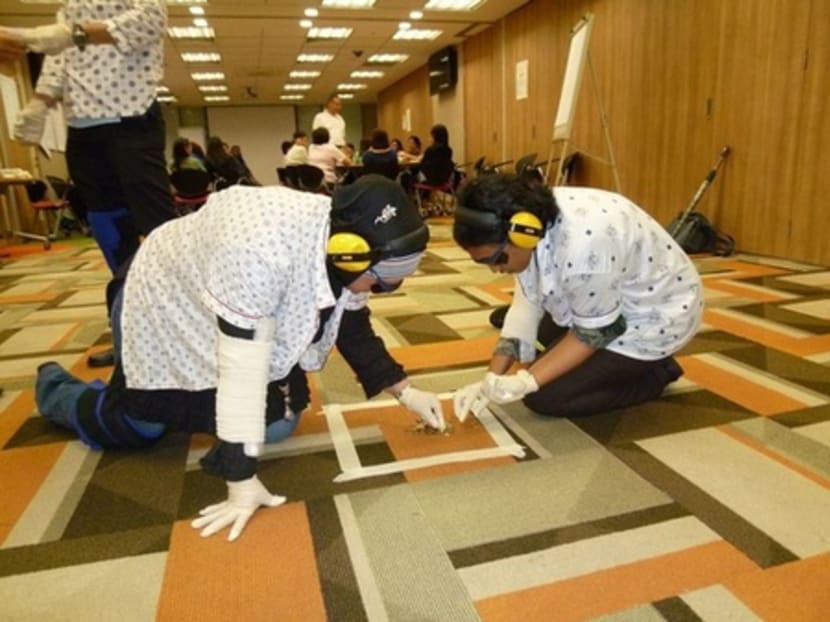Stepping into the shoes of the elderly
SINGAPORE — Ageing may feel like a faraway reality for many, but frontline staff at SingHealth’s 17 healthcare institutions, including the Singapore General Hospital and polyclinics, have been learning about what it can mean.

SingHealth staff attempting to pick up coins from the ground with their vision "impaired" to simulate the poor eyesight of some elderly, as part of the Age Sensitisation Workshop designed to help SingHealth better serve its elderly patients. Photo: SingHealth
SINGAPORE — Ageing may feel like a faraway reality for many, but frontline staff at SingHealth’s 17 healthcare institutions, including the Singapore General Hospital and polyclinics, have been learning about what it can mean.
For instance, eyesight may deteriorate till forms and papers appear to be a blur of letters, while signboards may look like fuzzy points of light.
With one in five adults in Singapore aged 65 and above in 2030, SingHealth, which serves close to one million elderly patients a year, has begun preparing its staff to better meet the demands of an ageing population, starting with what it feels like to be in their shoes and navigating hospitals and clinics.
Close to 1,200 front-line staff members and supervisors are involved in Age-Sensitisation Workshops where they learn to better relate to and serve elderly patients by undergoing simulations of the challenges faced by the elderly in their daily activities.
The workshops are part of SingHealth’s Age-Friendly Initiative, which also features a newly-launched handbook, Age-Friendly Guidelines, which has been co-developed with the Tsao Foundation.
It provides tips on how to be more elderly-friendly, such as what colour schemes are best for the elderly to help them make out signboards.
IN THEIR SHOES
A healthcare professional of three years, Ms Jacqueline Sim, 45, a Patient Service Associate at the Department of Diagnostic Radiology at the Singapore General Hospital, has considerable experience dealing with elderly patients.
Still, she gained a valuable lesson in empathy through the four-hour course, where she stumbled around in glasses smeared with Vaseline to simulate the blurred vision of the elderly and tried to count out change in coins while wearing gloves with sticky tape on the fingers.
Participants also had their arms and legs bandaged to let them understand how medical conditions restrict the physical movements of the elderly.
Ms Sim, who is often the first point of contact with patients requiring diagnostic radiology services, said the workshop helped her learn to be more patient and understanding with elderly patients.
One of the challenges she found when handling elderly patients was “their stubbornness”. “When we tell them about something and try to explain it to them, they might not understand. Being stubborn, they don’t accept our explanation,” she said.
The workshop, conducted by SingHealth and trainers from the Tsao Foundation’s Hua Mei Training Academy, ended with a session at which participants suggested new processes or improvements to make their institutions more elderly-friendly.
The initiative has led to SingHealth enlarging the font sizes on signboards, the introduction of Guides or Patient Ambassadors and “priority seats” equipped with armrests in clinics.
“The experiences of individuals always differ. Some young people live with their grandparents and can better identify with how an older person feels ... The simulation exercise sharpens that understanding,” commented Ms Sally Chua, Assistant Director at the Hua Mei Training Academy.
For many, their perception of what elderly patients are like are based on past experience with them, “which tends to lead to a person stereotyping all elderly persons as grumpy or impatient for instance”.
She added: “There is a need to appreciate and anticipate how ageing feels: Older people are not aliens, they are what we will become.”
SingHealth also holds regular lunchtime talks to help staff understand the difference between their perception of the services they provide and the actual experience of elderly patients. LOUISA TANG







